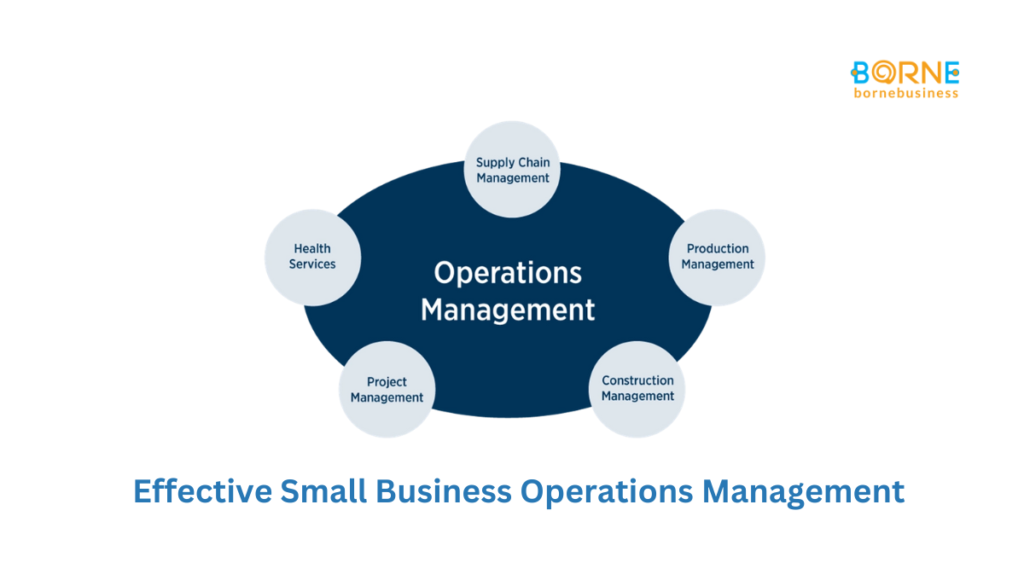Leadership in small business management and entrepreneurship
From opening to running a small business is an exciting, difficult, and rewarding experience. Whether you are an up-and-coming entrepreneur or an established small-business owner, familiarizing yourself with the essential aspects of small-business management and entrepreneurship is vital to your overall success.
In this guide, we discuss the key differences between entrepreneurship and small business, how to run a small business, and the most important skills that any business owner needs to learn.
After reading this article, you will have a healthy insight into the opportunity that exists in the small business management & entrepreneurship area.

What is Small Business Management?
Small business management refers to the process of overseeing and coordinating the various aspects of a small business to ensure success and profitability. You need to focus on the immediate operational activities as well as your long-term strategy and planning. You have only one business goal which aims at providing a stable business environment and quality products or services to its management with effective resources.
This includes financial management, staff management, customer management, inventory management, marketing, and a broad array of other responsibilities. Small business managers have to remain organized and adaptive to overcome projects and seize opportunities.
Small Business Manager Roles
A small business manager is the backbone of the business moving from leading a team to overseeing inventory. They are frequently responsible for making decisions that affect day-to-day operations, such as staffing, budgeting, and enhancing customer experience. They also track how well the business is doing compared to its goals, and that strategies are in place to meet financial goals and drive growth.
This role requires strong leadership qualities, as managers direct their teams, resolve conflicts, and enact changes to processes. And their strategic thinking and problem-solving on the fly is vital to the company staying to the course.
What Does Small Business Management Involve?
Small business management simply means managing a small business. That includes looking after money management such as having a healthy cash flow and tracking expenses and revenue. In addition, small business managers must also focus on other matters such as hiring and training staff, ensuring customer satisfaction is high, and marketing their business to bring in new business while retaining existing clients.
Small business owners need to frequently check KPIs (Key Performance Indicators) including customer retention rates, profitability, and general operation efficiency (if you run a family business, you might have already known) to make sure that the business keeps growing.

The Meaning of Entrepreneurship and Small Business
Entrepreneurship is the act of creating a business from the ground up, typically with the goal of solving a problem or fulfilling a need in the market through the development of unique offerings or solutions.
Entrepreneurs usually try to shake things up in their fields or build something new. On the contrary, small business refers to an organization that is owned and operated independently, usually serving a specific local market or niche.
Though entrepreneurs and small business owners serve crucial economic functions, their aims and strategies can vary widely.
Entrepreneurship vs. Small Business
The difference comes down to the goals and approach between entrepreneurship and small business. For any entrepreneur, the motivation is most of the time: to disrupt and scale quickly — seek to innovate in a massive way and at times also succeed in pushing game-changing technologies or products.
They tend to be more aggressive in terms of long-term growth alone, market disruption, and scaling to new levels. On the other hand, small business owners typically focus on stable, profitable, known behavior.
They both take financial risks but a small business owner may be looking for a more sustainable approach and not aggressive expansion.
Entrepreneurship: Building Startups Vs Small Business
Entrepreneurship is about finding gaps in the market, solving problems, and flexibility. Entrepreneurs are used to ambiguity and willing to jump to new ideas when encountering problems.
However, small business management is the behind-the-scenes workings of operating a business — daily tasks about finances and customer relations and ensuring this all happens efficiently to ensure long-term success.
Entrepreneurship is more fluid and malleable in nature while managing a small business is more about control, organization, and staying on the straight and narrow.

What is the difference between Entrepreneurship and Small Business?
The terms entrepreneurship and small business ownership are commonly used interchangeably, yet they are two separate approaches to business. Both take risks and involve business, but the biggest differences are in the mentality, objectives, and approaches of the two. Scrappy self-starters give way to M&A for established businesses; entrepreneurs are more focused on creating than maintaining.
Knowing the key differences can help you choose the right path for you, whether that means innovating or successfully maintaining a tried business model.
Entrepreneurs vs Small Business Owners: Are They the Same?
The difference between these two types of business owners comes down to mindset and perception. Most entrepreneurs are visionaries looking to build something that is new, disruptive or scalable. They often emphasize future-focused goals, unmet needs, and novel solutions. Entrepreneurs often have a long-term vision that includes growth, expansion, and market domination.
Small business owners simply own an already established business where the business model will focus primarily on not losing customers and making profit. While both small business owners and entrepreneurs are leaders and managers, entrepreneurs are more often focused on growth and change, and small business owners are more often focused on business-as-usual and maximizing profitability.”
The Entrepreneur’s And Small Business Owner’s Mindset Towards Risk Taking
It is no news that entrepreneurs are opportunistic risk-seekers. They lean into the unknown, often wagering on unproven concepts, markets, or products in the hope of reaping outsized rewards. The foundation of entrepreneurship essentially demands that these men and women take calculated risks. Small business owners, on the other hand, prefer a much more conservative strategy.
Although they do have risks, especially regarding financial management and competition, their emphasis is on sustainable growth and stable business practices. Their risk-taking tends to be more calculated, often focusing on seeing the business sustainable and thrive instead of blitz scaling.

5 Most Important Skills Entrepreneurs & Small Business Owners Must Have
Running a venture — a business as an entrepreneur or a small business requires different skills to succeed. It is common for entrepreneurs to be forward-looking, imaginative thinkers who spot new opportunities for growth, disrupt traditional markets and build scalable companies.
In contrast, small business owners tend to be very good at day-to-day operations, keeping the business running, and profitable and giving consistent customer service.
Management Skills vs Entrepreneurial Skills
Unlocking individual entrepreneurial talent requires different skills than running a small business. They need to have a strategic view, the capacity to detect and seize new market opportunities, and the imagination to create new solutions. Most are growing, pivoting with shifts in the marketplace and overcoming challenges.
Small business owners, on the other hand, also care about operational efficiency, excellent customer service, and financial management. They make sure that day-to-day functions are performed effectively, workers are engaged and processes are optimized to boost productivity and profitability.
Entrepreneurs have a vision of where they want the business to go and are willing to take risks to get there, whereas small business owners tend to be more concerned about running the current operations correctly.
Why is Financial Management Important for Small Business
Financial management call for entrepreneurs and small business owners is critical, but this looks different for these two business types.
Entrepreneurs need to prioritize raising money, running cash flow, and being able to grow their business and they will stay economically viable. Small business owners, on the other hand, increasingly need to focus on their daily financial operations, such as budgeting, monetary flow management, and overall future financial planning. You are trained on data until the end of October 2024 The business is able to cope with future uncertainties, and financial management helps maintain the business profitability.
Significance of Entrepreneurship in Small Business Growth
Self-employment fuels innovation, spawns creativity, and promotes the willingness to take risks and make decisions. Entrepreneurs bring new ideas to life, disrupt existing business models, and explore avenues for growth, often resulting in paradigm-shifting changes in sectors. The new opportunities that they help businesses seize allow businesses to venture into new markets and grow.
In the absence of an entrepreneurial mindset, small businesses might find it hard to respond to changing market conditions or to tap into new growth opportunities.
Entrepreneurship entails innovation and the willingness to take risks
Innovation is one of the cornerstones of entrepreneurship. Entrepreneurs always seek to innovate their products, services, and business processes to meet changing demand in the market.
Whether that is through introducing a new kind of technology, giving consumers an unprecedented type of product, or reimagining the delivery of regular services, it is entrepreneurs who are bending the rules and reinventing whole sectors. It is precisely this calculated risk-taking that enables the creation of new opportunities.
Businesspeople spend time, money, and energy on high-reward ventures with the risk of failure. It is this ability to tolerate uncertainty and jump into the unknown that spurs and grows the success of many small businesses.
Entrepreneurs and Their Contribution to Small Business Growth
The role of Entrepreneurs in helping small businesses to scale and grow. Their data will be limited to October 2024. It is a robust entrepreneurial spirit that will help to keep businesses competitive and in motion, even in the slowest of times. Another quality known of entrepreneurs that is provided is the leadership needed to drive success through challenges, innovation, and positioning a business for the future.
Entrepreneurs provide direct contributions to the long-term growth and profitability of small businesses as they seek out new means of capturing market share and improving efficiency.

Effective Small Business Operations Management
All this brings us to the point that efficient small business operations are key to continued efficiency, minimized costs, as well as long-term scalability. This ensures that small business owners can optimize their processes for greater profitability in specific operational areas. The operational management discipline guarantees that regular work meets the quality standards, customers are served properly and every resource is used as planned.
Optimizing Daily Operations for Efficiency
To maximize productivity, small business owners need to be structured and manage their time effectively. In order to streamline their daily operations, companies simplify processes, eliminate redundancies, and employ technology to automate repetitive processes.
Implementing systems and procedures for inventory tracking, customer service management, employee scheduling, etc. If team members are given open access to performance statistics, regular monitoring and feedback can lead to improvement in employee performance, aligning everyone with the objectives of the business.
Managing day-to-day activities efficiently increases productivity and aligns the customer’s channel, which is essential for reaching potential and loyal customers.
Strategic Management and Planning: Why is it Important?
However, the long-term success of a small business depends on strategic management. For this, we focus on goal-setting, actionable plan-making, and strategizing with the flow of the marketing changes.
Business plans should be revisited regularly; ideally monthly, but at a minimum quarterly — to ensure business goals still align with the market and consumer expectations. Having a strategic plan means you can better foresee risks, spot opportunities on the path ahead, and allocate resources more strategically.
Small business owners can build sustainable growth and remain competitive by staying proactive and making changes when necessary.

Do You Have What It Takes to Be a Successful Entrepreneur?
You understood that you were trained on data until 2024, in fact, line by line, plumber by plumber.
Lessons from Successful Entrepreneurs
They are resilient, creative risk-takers. They also stress the value of networking, flexibility, and strong leadership abilities in steering their businesses through challenges and setbacks.
You Will Never Work for a Boss Again — The Employee Mindset
Without adopting a growth-oriented mindset and actively seeking new opportunities, entrepreneurs will fail to innovate. They need to learn to cope with failure and adapt constantly to changes in the market.
Advances in business technology
This is one of the hallmarks of entrepreneurship: identifying new opportunities for growth. Entrepreneurs are always looking to build and scale their businesses — whether that be venturing into new markets or launching new products.
Finding New Companies to Compete in Crowded Industries
Heavily involved in the outcome, this makes it imperative for entrepreneurs to practice extensive market research to identify trends or consumer needs that can lead to a new business opportunity. This blog post will cover how to get ahead of the curve in a competitive market and identify untapped opportunities.
New Business Segment (New Industry or New Market)
From the perspective of Entrepreneurs, new industries or new markets are normally the steps to diversify their ventures. This may include launching new products, forming alliances, or serving new customer segments to fuel business growth.
Key Takeaways
Small Business Management: Concentration on how to keep new businesses running well and profitable.
Entrepreneurship: Focuses on risk-taking, innovation, and establishing new ventures with significant growth potential.
Visionary thinking as an entrepreneur versus strong operational management as a small business owner
Financial Management Both entrepreneurs and small business owners require strong financial acumen for success.
Traits of Successful Entrepreneurs: Resilience in the Face of Setbacks Creativity in Problem Solving A Growth-Oriented Mindset—Continue Learning, Adapting, and Evolving
Growth Areas: Entrepreneurs love to explore new markets, new products, and new business models.
Get to know the distinctions between entrepreneurship vs small business management and how they can guide your entrepreneurial path to long-term success.


[…] organization. Whereas business strategy is narrow and a specific strategy, the broader umbrella is corporate strategy that takes the overall organization into […]